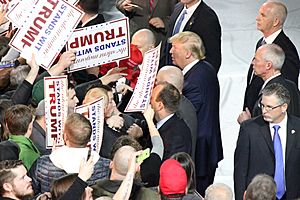Silent majority facts for kids

A silent majority is a large group of people who agree with something but choose not to share their opinions publicly. They might support a leader, a policy, or an idea, but they don't usually join protests or speak out loudly.
Contents
How the Term Became Famous
This term became very popular because of Richard Nixon, who was the President of the United States from 1969 to 1974. On November 3, 1969, President Nixon gave an important speech about the Vietnam War. In his speech, he said, "And so tonight, to you, the great silent majority of my fellow Americans; I ask for your support."
Nixon used this phrase to describe the many Americans who he believed supported his plans for the war, even if they weren't protesting in the streets. He suggested that while a smaller, "noisy minority" was protesting loudly, most Americans quietly agreed with him.
Understanding the Silent Majority
The idea of a silent majority suggests that public opinion isn't always shown by the loudest voices. Sometimes, the people who don't speak up are actually the majority. This can be important in politics because it means leaders might try to appeal to these quiet supporters.
Why People Might Be Silent
There are many reasons why people might be part of a silent majority:
- They feel their opinion is already clear: They might think there's no need to speak up.
- They are busy: They might not have time to join protests or write letters.
- They avoid conflict: Some people prefer not to argue or draw attention to themselves.
- They feel their voice won't change anything: They might think speaking up won't make a difference.
Examples of the Silent Majority
The idea of a silent majority has been used in different situations throughout history.
People Who Don't Speak Up
Sometimes, people might disagree with something happening around them but choose not to speak out. This could be because they are afraid, or they feel it's safer to stay quiet. For example, during difficult times in history, some citizens might have privately disagreed with their government's actions but did not publicly protest. This doesn't mean they agreed, but rather that they were part of a group that didn't openly express their opposition.
See also
 In Spanish: Mayoría silenciosa para niños
In Spanish: Mayoría silenciosa para niños
 | Stephanie Wilson |
 | Charles Bolden |
 | Ronald McNair |
 | Frederick D. Gregory |

